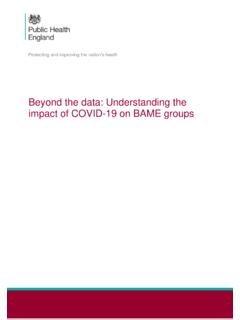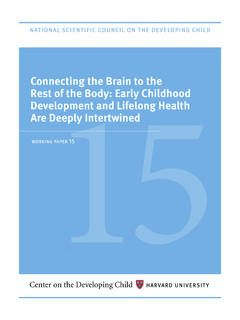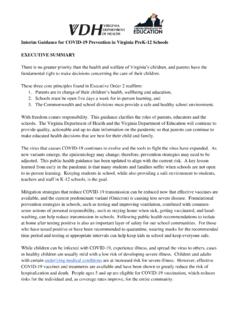Transcription of RECOVERY COMMUNITY ORGANIZATION TOOLKIT
1 RECOVERY COMMUNITY . ORGANIZATION TOOLKIT . 840 First Street, 3rd Floor Washington, DC 20002 TABLE OF CONTENTS. Introduction RECOVERY COMMUNITY Organizations I. RECOVERY COMMUNITY Organizations: Core Principles Page 5. II. RECOVERY COMMUNITY Organizations: Core Strategies Page 7. III. RECOVERY COMMUNITY Organizations: Examples Page 10. IV. Statewide RECOVERY COMMUNITY organizations: Advocacy Focus Page 14. V. Local RECOVERY COMMUNITY Organizations Page 15. VI. Learning from Experience: Keys to Successful RECOVERY Page 16. COMMUNITY Organizations VII. Steps for Creating a RECOVERY COMMUNITY ORGANIZATION Page 19. ACKNOWLEDGEMENTS. This TOOLKIT was developed with support from the Open Society Foundation and the generous donations of Faces & Voices of RECOVERY supporters. The Association of RECOVERY COMMUNITY Organizations at Faces & Voices of RECOVERY is a growing network of RECOVERY COMMUNITY organizations across the nation. More information is available online at January 2012. PAGE 2. INTRODUCTION.
2 When Faces & Voices of RECOVERY was founded in 2001, we stood on the shoulders of a rich history of organized advocacy by the addiction RECOVERY COMMUNITY people in RECOVERY , their families, friends and allies. Marty Mann founded the National Council on Alcoholism almost 70 years ago to provide education to raise the awareness of addiction and RECOVERY across our society. Bill Wilson, the co-founder of Alcoholics Anonymous, testified before Congress on the Hughes Act, envisioning a day when hundreds of AAs would fill the halls of Congress to demonstrate wellness and RECOVERY . The late Senator Harold Hughes, a person in long-term RECOVERY from addiction, founded the Society of Americans for RECOVERY in 1991. The Society of Americans for RECOVERY (SOAR) is a grass-roots ORGANIZATION of concerned people from all walks of life. It is dedicated to the fundamental belief that alcoholic and drug-dependent people and their families should have the same rights and privileges as all other people.
3 It strives for a better understanding that treatment and RECOVERY will reduce other health, social, and economic problems. Please join us to champion hope, justice, and opportunity for all whose lives are damaged by diseases of alcoholism and drug dependence. - Senator Harold Hughes, SOAR Founder and Chairman Faces & Voices of RECOVERY was founded to provide focus for a growing advocacy force. Faces & Voices is dedicated to organizing and mobilizing the over 20 million Americans in RECOVERY from addiction to alcohol and other drugs, our families, friends and allies into RECOVERY COMMUNITY organizations and networks, to promote the right and resources to recover through advocacy, education, and demonstrating the power and proof of long-term RECOVERY . In many cases, RECOVERY voices are marginalized and ineffective when the work is shouldered primarily by lone individuals. As we know from the great social movements that precede ours, the public, policy makers, and the media can easily ignore individual voices.
4 In fact, the reality of long-term RECOVERY is often overshadowed by media and public fascination with active addiction and popular myths supported by stories of celebrities' very public struggles with the dark side of addiction. Never doubt that a small group of thoughtful committed citizens can change the world;. indeed, it's the only thing that ever has. - Margaret Mead Long-term RECOVERY from addiction to alcohol and other drugs is real for over 20 million Americans and thousands more get well every year, benefiting individuals and their families, the communities in which we live, work and go to school. There are as many different paths to RECOVERY as there are different people in RECOVERY . Regardless of how people achieve RECOVERY , they are the living proof that RECOVERY happens and that there are real solutions to the problem of addiction to alcohol and other drugs. Times have changed. As the RECOVERY COMMUNITY has unified around key priorities to gain needed resources, embrace all pathways to RECOVERY , innovate and provide services, and to end discrimination against people in or seeking RECOVERY , new institutions have developed across the country.
5 PAGE 3. Building strong RECOVERY COMMUNITY organizations is one way to break feelings of isolation and shame, build strong relationships, and advocate for the solutions that we know work. Grassroots organizations develop RECOVERY leaders, offer opportunities to express a collective voice and provide a forum for COMMUNITY service. Coming together to build a constituency of consequence means acting together to bring about positive changes in COMMUNITY life through public action. RECOVERY COMMUNITY organizations are usually created by people in personal and/or family RECOVERY in response to unmet needs in their communities. Often, they exist as voluntary advocacy and service organizations for some time before they have funding to support their activities on a more formal basis. They have learned that deliberate effort and regular adjustments to their plans and activities is required to strike a balance between building an ORGANIZATION that has the capacity to bring about real change and keeping an agenda focused on making a real difference in the lives of people in the RECOVERY COMMUNITY .
6 We know that when the RECOVERY COMMUNITY works together organizes we have the ability to improve all of our lives. Many of us have carried a message of hope on a one-to-one basis; this new RECOVERY movement calls upon us to carry that message of hope to whole communities and the whole culture. It is time we stepped forward to shape this history with our stories, our time and our talents. - William White, RECOVERY historian PAGE 4. RECOVERY COMMUNITY ORGANIZATIONS. Across the country, organizations that are independent, non-profit, led and governed by people in RECOVERY , family members, friends and allies are mobilizing resources within and outside of the RECOVERY COMMUNITY to make it possible for the over 23 million Americans still struggling with addiction to find long-term RECOVERY . Each ORGANIZATION has a mission that reflects the particular issues and concerns of their COMMUNITY . I. RECOVERY COMMUNITY ORGANIZATIONS: CORE PRINCIPLES. All groups share three core principles RECOVERY vision; authenticity of voice; and accountability to the RECOVERY COMMUNITY .
7 RECOVERY vision RECOVERY COMMUNITY organizations focus on the reality of long-term RECOVERY from addiction to alcohol and other drugs for over 20 million Americans and their families. The RECOVERY COMMUNITY ORGANIZATION , its leaders, and members have a singular goal: enhancing the quantity and quality of support available to people seeking and experiencing long-term RECOVERY from addiction. Faces & Voices of RECOVERY envisions a day when public and private policies have been implemented at the local, state, and federal levels to help individuals and families get the help they need to recover, including access to effective care including treatment and peer and other RECOVERY support services. Policies that discriminate against people in or seeking RECOVERY will have been reversed and removed. The focus is on the solution that involves mobilizing individual and COMMUNITY resources to promote RECOVERY , not a particular service or model of care. One of the founding principles of Faces & Voices of RECOVERY is embracing all pathways to RECOVERY .
8 This principle is embodied in our RECOVERY Bill of Rights, a statement of a RECOVERY vision and agenda. While RECOVERY COMMUNITY organizations form strategic alliances with like-minded partners, this vision is distinct from that of for example, human service agencies, faith- based and other COMMUNITY organizations, professional addiction treatment, and mental health treatment, and primary care providers. There are mission and vision statements from a variety of RECOVERY COMMUNITY organizations in the Resource Section. Authenticity of voice Authenticity of voice means representing the interests of communities of RECOVERY . A guiding principle is self-governance, mutual aid and support. RECOVERY COMMUNITY organizations are developing to serve communities, with leadership by and for COMMUNITY members. RECOVERY COMMUNITY organizations have a majority of board members, managers, staff, and volunteers drawn from the COMMUNITY . This strong connection is the source of a RECOVERY COMMUNITY ORGANIZATION 's strength and ensures that the voice of the RECOVERY COMMUNITY takes precedence over other interests.
9 PAGE 5. By developing and nurturing strong grassroots networks, RECOVERY COMMUNITY organizations develop leaders, offer opportunities for people to make their voices heard, and provide a forum for COMMUNITY service. Vibrant RECOVERY COMMUNITY organizations insure that the voices of people who have the lived experience of RECOVERY , including family members, are heard and embraced and that the ORGANIZATION 's public education, advocacy, and RECOVERY support services respond to the broadest spectrum of local RECOVERY needs. Accountability to the RECOVERY COMMUNITY RECOVERY COMMUNITY organizations' credibility and effectiveness depends on their ability to be accountable and responsive to the COMMUNITY they work in and with. In most cases, this means being an independent, stand-alone nonprofit ORGANIZATION , where they can manage their relationships with other organizations. For example, a RECOVERY COMMUNITY ORGANIZATION may work closely with an association of treatment providers, a Drug Court, a COMMUNITY Prevention Coalition or a hospital, but be independent of them in their governance.
10 Independence allows a RECOVERY COMMUNITY ORGANIZATION to bridge the gaps between the RECOVERY COMMUNITY and government agencies, the criminal justice system and the larger network of health and human services providers. The RECOVERY COMMUNITY ORGANIZATION 's real strength is drawn not from its links to other service organizations but from the authentic voice of the individuals in the RECOVERY COMMUNITY who relate to and actively support it. RECOVERY COMMUNITY organizations recruit and engage people in RECOVERY , family members, friends and allies to advocate on behalf of their own, identified interests. Wherever possible, RECOVERY COMMUNITY organizations use something called participatory processes different ways to involve both leaders and members to weigh in on decisions on programming and policy. RECOVERY COMMUNITY organizations provide an organized way for people to give back to their communities through volunteer and paid service to others seeking RECOVERY and work with allied organizations by offering RECOVERY support services, advocating on common public policy agendas, and broadening public understanding of the reality of RECOVERY while remaining accountable to the RECOVERY COMMUNITY .





